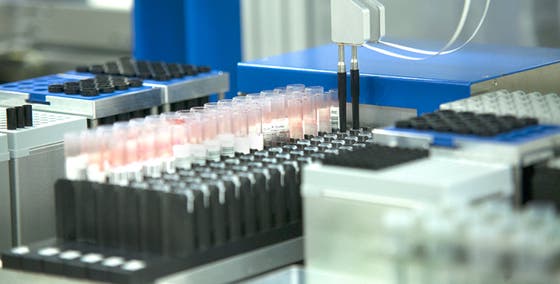Our diagnostic tests - Genome Diagnostics Section
The Genome Diagnostics Section of the Department of Genetics consists of the Laboratory for Clinical Molecular Genetics (DNA diagnostics) and the Laboratory for Clinical Cytogenetics (chromosome testing). For both prenatal and postnatal genetic diagnostic tests various advanced analysis methods are used. The Section offers molecular and cytogenetic high quality tests for a large number of hereditary and congenital disorders.

Prenatal diagnostics uitklapper, klik om te openen
The majority of children are born healthy, yet a small number of children, around 4 out of 100, have a hereditary or congenital disorder. In some cases, for specific disorders, testing may be possible during pregnancy. Such tests do not answer the question whether a child is otherwise healthy and whether it may suffer from any other disorder.
Tests are performed on amniotic fluid, chorionic villi and blood from the umbilical cord. Targeted prenatal DNA testing is carried out in families where a genetic defect was previously diagnosed.
Postnatal diagnostics uitklapper, klik om te openen
The Genome Diagnostics Section offers postnatal genetic tests in families suspect of a genetic disease. This includes hereditary disorders caused by structural changes in chromosomes, by methylation defects or by mutations in specific disease genes. A postnatal test can be used either to confirm or reject a clinical diagnosis and can also be used to determine whether a patient is carrier of a familial mutation. The advanced test methods include a.o. semi-automated fluorescence-based DNA sequencing ('DNA sequencing'), Next Generation Sequencing (NGS), SNP array copy number analysis, Karyotyping, Multiplex Ligation-dependent Probe Amplification (MLPA) and analysis of amplified polymorphic DNA markers.
Moleculair diagnostics uitklapper, klik om te openen
A DNA test can be used either to confirm or to reject a clinical diagnosis and can also be used to determine carrier status or can be used within the scope of prenatal diagnosis. In addition to classic Sanger sequencing, state-of-the-art testing methods are used such as SNP array, MLPA and Next Generation Sequencing (NGS). NGS well suited to detect the genetic cause of diseases characterized by a high degree of genetic heterogeneity. The Genome Diagnostics Section can offer NGS for diseases such as epilepsy, cardiac and auto-inflammatory diseases, kidney disorders and for intellectual disabilities. On the "Request form DNA diagnostics" a complete overview of the molecular genetic tests that are offered is provided.
Emergency diagnostics uitklapper, klik om te openen
For emergency diagnostics, please contact our staffmember on duty first. 088 75 538 00 or 088 75 555 55.
Turnaround times diagnostics uitklapper, klik om te openen
| Objective | Genetic defect known in the family? | Turnaround times (weeks) ) |
|---|---|---|
| Prenatal DNA testing | Yes | 3 |
| DNA carrier test | Yes | 4 |
| Presymptomatic DNA testing | Yes | 4 |
| Confirmation/exclusion of a DNA diagnosis | No | 10 |
| Confirmation/exclusion of a DNA diagnosis | Yes | 4 |
| NGS gene panels | No | 16 - 24 |
| Exome sequencing | No | 20 |
| Array diagnostics | Yes/No | 4 |
| Karyotyping/FISH | Yes/No | 4 |
